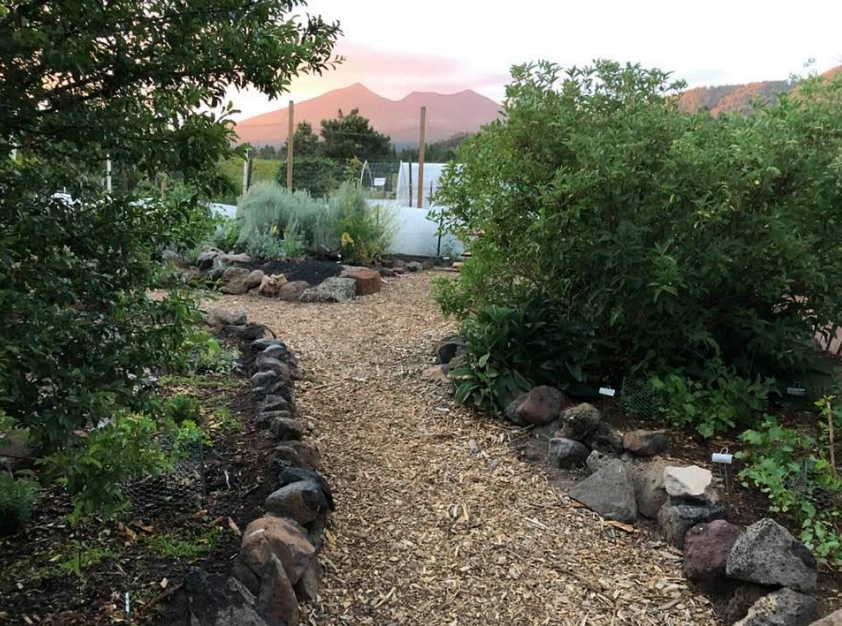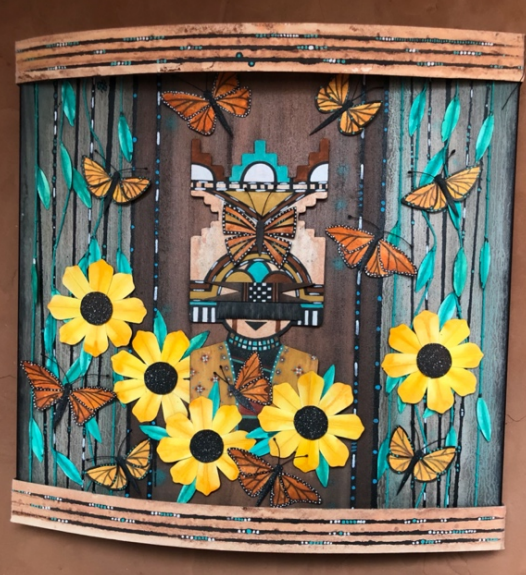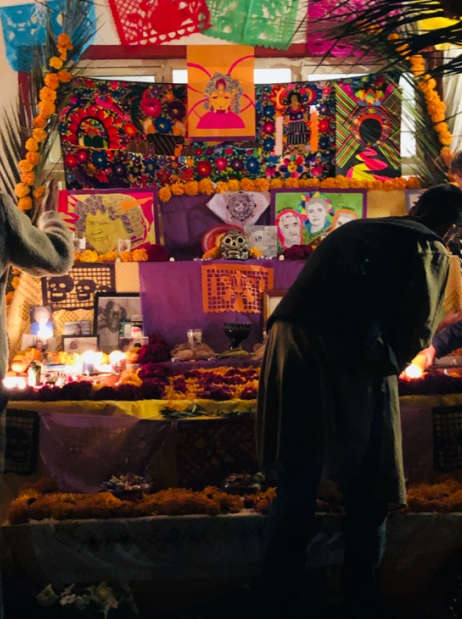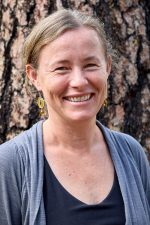Finding love and reciprocity in the garden during challenging times by growing community-based learning experiences.
by Rosemary Logan

This evening I can nearly taste the scent of the damp clay earth with tinges of resinous pine at the Colton Community Garden in Northern Arizona. I can feel the cool air on my skin and a deep sigh from both plant and animal as they drink deeply from the gift of this afternoon monsoon at the base of a sacred mountain called Dook’o’oosłííd in the Diné language and Nuva’tukya’ovi in Hopi. The shift in seasons is apparent in the sink of cool air, chatter of birds, and carpet of yellow flowers across the land. The mountain rises up in a deep blue-purple hue above the heavy clouds. Soon the frosts will glide down the mountain and visit this patch of earth on which I stand, and the plants that I’ve been tending to will again enter a deep winter rest. For this one moment in time, my entire body soaks in the golden glow of sunflower with the last pulsing light of day.
This garden has been an anchor for me for years and more recently has evolved into a true sanctuary from the challenges of the past year. With two young children at home, as well as dogs, rabbits, and chickens, we’ve created our own little urban homestead of sorts. It is a total and utter zone of chaos, but it is the kind of chaos that tethers me to place. After two months of teaching university courses full-time online, screaming children, wrestling dogs, and two chicken casualties, this garden became an evening ritual escape; the little tiny food forest corner, in particular.
As COVID started to take its hold in spring 2020 this little plot of land took shape under the loving care of Permaculture Design Course students from a graduate program in Sustainable Communities. In the previous fall of 2019, our 20 students shaped earth into form, creating a spiraling, mini, high elevation food forest. As learning moved online in the spring, we still managed to gather in the garden, masked and distanced, planting trees and shrubs. Among the pain of isolation, growing awareness of the climate crisis, and massive racial inequities, we planted seeds of hope in the form of cover crops and strawberries, drawing forth the bees and building soil and promises for the future. We laughed; we cried; and we shared in our struggles. We put our love, prayers, and hopes into our biodynamic water vortex, water spinning one direction, then the next. To our tremendous delight, the garden responded in kind with abundant growth and beauty.
Reciprocity and Love in a Garden
There’s a Hopi word, siitala (see-tah-lah), that translates directly as “a land brightened with flowers” (Museum of Northern Arizona). The metaphorical meaning is often interpreted as “the reciprocity between humans and the natural world that is necessary for all elements of life to thrive.” What we witnessed in that garden was a reciprocal dance of humans and plants, beauty, and life.

This concept of siitala supports the notion that human beings are an integral part of the natural systems to which they belong. As such, they may either enhance or degrade those ecological systems. From a permaculture perspective, humans can not only do “less harm,” but they can also have the transformative potential to enhance the bio productivity and health of the planet. In doing so, the relationship between living systems and humans shifts from one of taking and receiving to one of mutuality.
As Indigenous researcher and educator Robin Kimmerer posits, “Knowing that you love the earth changes you, activates you to defend and protect and celebrate. But when you feel that the earth loves you in return, that feeling transforms the relationship from a one-way street into a sacred bond” (Braiding Sweetgrass). Just as we love and care deeply for our beloved garden, might we also consider the possibility that our love is returned? Flowers, fruits, and herbs – all gifts from our beloved? Can we extend that image to consider learning that also embraces beauty and the diversity of life through love?
I’ve spent the better part of the last seven years working to bio-culturally situate and bring to life sustainability and food system-focused first year seminar courses at a state university in Arizona. With each passing year, I have encountered students with growing levels of anxiety and depression. The pandemic brought that rate to an all-time high. As we gathered online in the spring, 2021, the stress and fear were palpable. In one of my first-year courses, Growing Community, which focused on the practice of placemaking and community gardens as spaces for transformation, I was forced to shift our collective hands-on learning in the garden to students planting seeds at their own homes. As we received notice that students were to vacate the university campus we scrambled to collect potting soil, pots, and seeds. After the first week online our class check-ins began to morph into glorious reports on the growth of their seedlings.
“MY SEEDS SPROUTED!!!”
“MY PLANT GOT ITS FIRST LEAF!!!”
As the weeks went by, these reports shifted in nature, peeling back layers of emotion.
“I can’t believe I’ve kept this plant alive. I am so proud of myself!”
“With all the stress and challenges of my day checking on my seedlings are literally the highlight of my day. No joke. I check on them like ten times a day to see how they are.”
“My grandmother gave me corn seeds that her mother brought with her from Mexico and we planted them together in our backyard. I’ve missed my grandma so much since leaving for college. It was really nice to spend this time with her.”
One student in particular struggled to make it to class but immersed himself in this assignment. With his parents’ permission, he tore up the entire side yard and planted his own garden of corn, beans, squash, tomatoes, peppers, lettuce, and potatoes. This student went from sporadic attendance to near-perfect attendance online, during a pandemic.
The Ecoversities Movement
“What might the university look like if it were at the service of our diverse ecologies, cultures, economies, spiritualities and Life within our planetary home?” ~ Ecoversities Alliance Website
Driving West from the Morelia airport in late October 2019 towards lake Patzcuaro in the state of Michoacán, Mexico, one can see field after field of golden flowers—preparations for Dia de Los Muertos and the annual monarch migration. One can only imagine the fields from the air, a highway of color welcoming the annual return of butterflies to the winter resting place for monarchs living east of the Rocky Mountains in the continental United States. A land brightened with flowers.
The monarchs are considered an embodiment of the spirits of the dead coming back to visit loved ones. The festivities center on welcoming both the monarchs and loved ones home with displays of magnificent beauty—ofrendas backlit with the glow of candles and cascading flowers, photos of, and favorite foods for, those that have passed on. Music and dance, and magnificent costumes call the spirits home to be with their beloveds. The monarchs come to roost for one last time before laying the next generation of butterflies.

Just as the monarchs were returning home to their mountain refuge, we – a group of over a 100 – made our way to the hills adjacent to lake Patzcuaro for the fifth annual global Ecoversities gathering. The alliance itself includes representation and leadership from over 260 ‘member’ organizations from 47 countries and 50 languages. This gathering alone, was immensely diverse and created a sacred space for emergence, for love, connection and transformation. We had joined together to nurture a collective vision of higher education that better serves the diverse ecologies of our planetary home.
This global response to the need for authentic higher education learning that honors “diverse ecologies” is happening within the ecotones. This collective response is profoundly beautiful, diverse, and teeming with life. In these spaces multiple, divergent cosmologies are deeply honored and allowed to co-exist. Members share their diverse worldviews and practices of ritual, healing, and transformation. We share our pain and our celebrations; participate in a process of decolonizing and un-learning, healing and regeneration; forge deep relationships and germinate new ideas. The world blooms anew with possibility.
Just as the monarch must migrate back to its ancestral homelands in order to give birth to a new generation, undergoing massive transformation in the process, so must we undergo our own collective transformations. May we collectively create spaces of learning, from our diverse cosmologies, that honor a land brightened with flowers.
Growing Edges
Since we gathered in the community garden and in the hills of Patzcuaro, much has changed. The first-year seminar sustainability-focused, community-based courses and the graduate level permaculture design course, were eliminated. These decisions are part of a larger trend within traditional higher education that values disciplinary silos over integrated learning, profit over service to the community, and information acquisition over holistic, whole-person learning. What will be the cost to the youth that we were entrusted with serving? What will be the cost to our planetary home?
I really had no choice but to leave my beloved job of seven years at the university. At the center of my decision to leave was the way my whole being remembered being in relation, and in community, in our ecoversities gathering in Michoacán. Hearing stories of ways that communities around the world were rising up and offering alternatives to mainstream education that truly honored Indigenous wisdom, that were regenerative in their care for the earth, and fair and just in their commitment to intergenerational learning, issues of sovereignty, and racial and environmental disparities. I found I could no longer reconcile this calling to teach in a way that was truly earth- and people-honoring with the changes to my job. With a vision for bringing ecoversity work into being, and a hope that this work might find roots at a new, sustainability-focused college, I handed in my notice.
I won’t pretend that this decision during the time of COVID was easy. I experienced a surprising amount of grief and sense of loss as I let go of my old world and leaned into the new. Sleep did not come easily and my deepest dreams of co-creating a bioregionally-rooted micro college have not been without challenge. In the midst of caring for my family and amid swirling bouts of anxiety I did discover something more important—the importance of just being. When I stopped trying to produce outputs and instead tended to the needs of my aching heart for stillness and beauty, restoration and healing, my mental health started to improve. With the support of the garden, loved ones, and counseling, I was better able to cultivate a practice, in the words of my dear friend Ngaragni, of “listening not only to the heart of the mind, but also the mind of the heart”.
An invisible thread inside me tugs between a fire and sense of urgency that I feel in my belly and a deeper knowing that rests in my heart. The fire burning in my belly knows that my choices today impact the choices that my children will have in the future. My heart knows that the best choices are made by listening deeply to our intuition and in a deep honoring of the gifts that we each have to give to the world. Instead of impulsively saying “yes” to everything, in this past year I’ve started to first ask myself the question “does this action create more life?” And secondarily, “does this action employ my unique set of skills as well as have an amplifying impact?” Am I merely working alone in this action or am I part of inspiring a movement of chance?
These days I sleep deeply again. My tired bones sink into the mattress, and before I can begin to imagine the next day’s happenings my breath has slowed and cleared my mind. I rest in knowing the good work that the next day will bring and in knowing in my body, the possibility that love grows; love grows in a garden.

Rosemary Logan, Ph.D. teaches food, field, and sustainability-focused courses for The Enlivened Learning Cooperative and Northern Arizona University. She teaches a wide variety of sustainability and permaculture courses, initiated food studies projects, and conducts research in transformative sustainability learning. She is the recipient of Northern Arizona University’s 2016 Sustainability Faculty Award, 2017 Teacher of the Year Award (University College), and 2019 Sustainability Leadership Award.
Contact: rosemaryglogan@gmail.com or www.growing-community.org


